高三英语复习课件:英语倒装句讲解1
- 格式:dps
- 大小:405.00 KB
- 文档页数:51
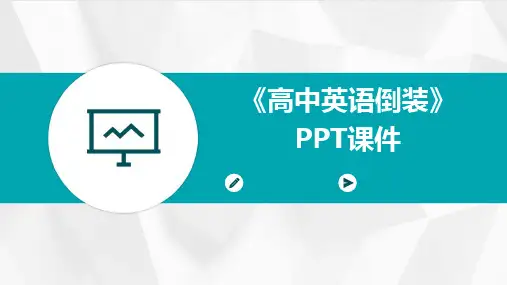
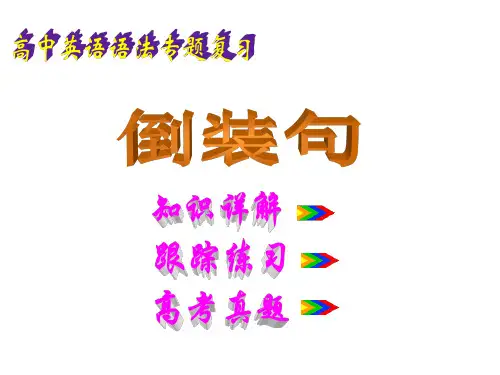
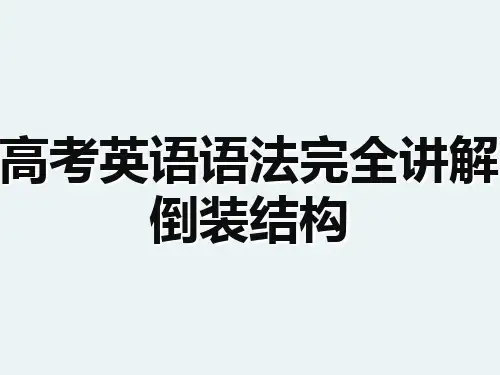

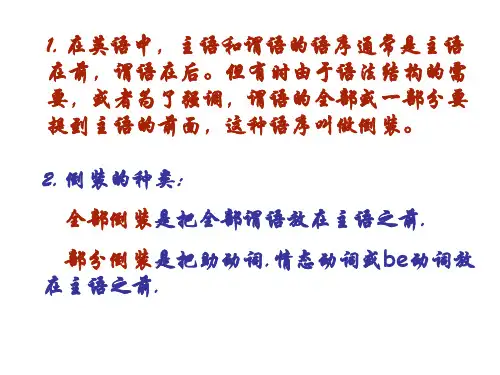


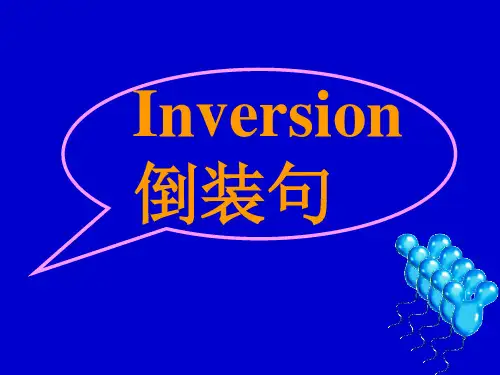
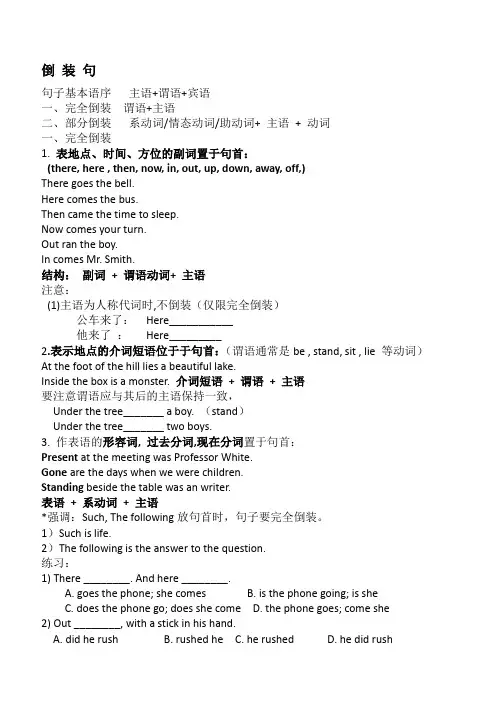
倒装句句子基本语序主语+谓语+宾语一、完全倒装谓语+主语二、部分倒装系动词/情态动词/助动词+ 主语+ 动词一、完全倒装1.表地点、时间、方位的副词置于句首:(there, here , then, now, in, out, up, down, away, off,)There goes the bell.Here comes the bus.Then came the time to sleep.Now comes your turn.Out ran the boy.In comes Mr. Smith.结构:副词+ 谓语动词+ 主语注意:(1)主语为人称代词时,不倒装(仅限完全倒装)公车来了:Here___________他来了:Here_________2.表示地点的介词短语位于于句首:(谓语通常是be , stand, sit , lie 等动词)At the foot of the hill lies a beautiful lake.Inside the box is a monster.介词短语+ 谓语+ 主语要注意谓语应与其后的主语保持一致,Under the tree_______ a boy. (stand)Under the tree_______ two boys.3. 作表语的形容词, 过去分词,现在分词置于句首:Present at the meeting was Professor White.Gone are the days when we were children.Standing beside the table was an writer.表语+ 系动词+ 主语*强调:Such, The following放句首时,句子要完全倒装。
1)Such is life.2)The following is the answer to the question.练习:1) There ________. And here ________.A. goes the phone; she comesB. is the phone going; is sheC. does the phone go; does she comeD. the phone goes; come she2) Out ________, with a stick in his hand.A. did he rushB. rushed heC. he rushedD. he did rush3) ________ from the top of the building when the policeman pointed the gun at him.A. Jumped down the robberB. Jumped the robber downC. Down jumped the robberD. Down the robber jumped4) ________, a man of achievements, deep thoughts, but with simple habits.A. Einstein was suchB. Such was EinsteinC. Einstein was soD. So was Einstein二、部分倒装部分倒装是把be动词、情态动词、助动词放到主语之前。
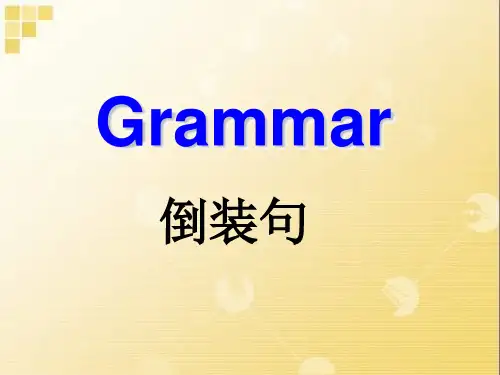

Grammar Inversion --倒装句1.倒装句的定义英语最基本的词序是主语在谓语动词的前面。
如果把谓语动词放在主语前面,就叫做倒装.Inversion is the changing of the order of the words in the sentence.2.倒装句的构成a)完全倒装b) 部分倒装In came the headmaster, followed by a group of teachers.•将句子的主语和谓语完全颠倒过来,称之为完全倒装。
Seldom have we felt as comfortable as here. •只将助动词、系动词或情态动词移至主语之前,谓语的其他部分仍保留在主语的后面,称之为部分倒装。
1)句首状语引起完全倒装•(1)“here (there ,now ,then, thus, first, next )+不及物动词+主语”•(2)以out ,in ,up ,down ,away, back, off, inside, outside,Thus ,high,low 等副词开头的句子里,以表示强调。
①车来了。
Here _________________②铃响了。
There_________________③该你的了。
Now__________________④孩子们出去了。
Out __________________comes the bus.goes the es your turn.went the children.They went out.Here he comes.注意:当代词做主语时,主谓语序不变, 不倒装。
⑤他们出去了.⑥他来了。
•Higher and higher_____ and then the kite was out of sight.•A. flew it•B. did it fly•C. it flew•D. was it flying(3)当句首状语为表示地点的介词词组时,也常常引起全部倒装①城南有个大型钢铁厂。
South of the city lies a big steel factory.②这些东西里有圣诞树、花儿、蜡烛和玩具Among the goods is Christmas trees, flowers, candles and toys. 。
(4)表+主+….Gone are the days when the Chinese people were only slaves.Seated on the ground are a group of young people. Standing beside the table was an translator.Present at the meeting were many guests.*当句首状语为不表示地点的介词词组时,引起部分倒装On the back wall hung a picture of my family. Under a tree sat a pretty girl.Beside me sat two students.In this way can we explain the matter.(5)完全倒装用于句型“There+live/lie/stand/exist/remain/be/seem to be/happen to be/used to be/oughtbe/must be /can’t be) +主语”There stands a tall tree in front of the classroom.2)部分倒装(1)用于so/as,nor,neither开头的句子,表示重复前句部分内容,原句的谓语应与前句谓语的时态、形式相一致①他去过北京,我也去过。
He has been to Beijing. So/As have I.②李威回答不了这个问题,我也不能。
Li Wei can't answer the question. Neither can I.如果谓语动词既有肯定又有否定,或谓语动词有多种形式,用so it is with 结构.-------I caught the first bus, I am not late for work.-------So it is with him.注:有时为表示对上文情况的肯定和确认,用正常语序表“确实如此”-------He can speak good English.-------So he can.•---He works hard.•----_________and_________.•A. So he does…..so does his brother.•B. So does he …..so his brother does.•C. So he does… so his brother does.•D. So does he …. so does his brother.(2)用于否定词或短语开头的句型中用于never, hardly, seldom, scarcely, barely, little, often, no , neither , nor, few,at no time, nowhere ,in vai徒劳not once等词放在句首的句子。
〈1〉我再也不会这么做了。
NeverNever shall I do this again.〈2〉他不太知道那个女的是谁。
LittleLittle did he know who the woman was.2)含有否定意义的一些副词,如hardly, scarcely,seldom,little,rarely,never,not/ no/neither/nor/few/nowhere/in vain (徒劳)等位于句首时,引起部分倒装。
还有一些表示否定意义的介词短语位于句首时,句子也要求用倒装结构,常见的这类介词短语都还有“no”, 如,at no time, in no case, by no means, in no way, under/ in no circumstance 等。
in no way/case =on no occasion=by no means=on no account=in / under no circumstances(决不)如,a) Under no circumstances shall I change my attitude towards beauty.无论如何我都不会改变自己对美的态度。
b) At no time and in no circumstances should the fire doors of the building ever be locked.无论什么时候,什么情况下,建筑物的消防通道们都不能锁上。
c) Not a single mistake did I make.d) In vain(无结果的,徒然)did I try to change his mind.f) Seldom does she show her feelings, even when she is said..((3).用于no sooner… than…,hardly… when,scarcely … when;not until, not only …but also ,neither …nor …的句型中。
我刚到她就走了.Hardly had I arrived when she left .No sooner had I arrived than she left.•“一… 就…”, “刚刚….就“句型中,表示一件事情紧接着另一件事情发生。
•Hardly•Scarcely +倒装句(过完)+when +陈述句(过去)•barely•No sooner +倒装句(过完)+than+陈述句(过去)•Hardly /scarcely/ barely had he arrived at the station when the train began to leave.•No sooner had I gone out than he came to see me.3) 含not until的强调句,如果not until位于句首,句子要求用倒装结构,如果是主从复合句,倒装结构出现在主句中。
如,a) Not until all the fish died in the river did the residents realize how serious the water pollution was.b) Not until then did he come to realize how serious the situation was. c) Not until it was dark, did we arrive at the village.直到老师来了,他才写完作业。
Not until the teacher came did he finish his homework.•Not until + 陈述句/时间状语+ 倒装句•Not until the child fell asleep did themother leave the room.•Not until yesterday did I learn it.•(当Not until 引出主从复合句,主句倒装,从句不倒装•Not only +倒装句+but (also )+陈述句•Not only did we lose our money, but also we came close to losing our lives.注:主句部分倒装,从句不倒装;并列连词连接主语成分时,句子不倒装。
Not only could she type but also she could operate the computer.Hardly had he got on the bus when he heard a shout.Neither in school nor at home did he ever wash his clothes.Not only children but also grown-ups are interested in cartoon.(4)用于only开头的句子(only 后面跟副词、介词短语或状语从句)。